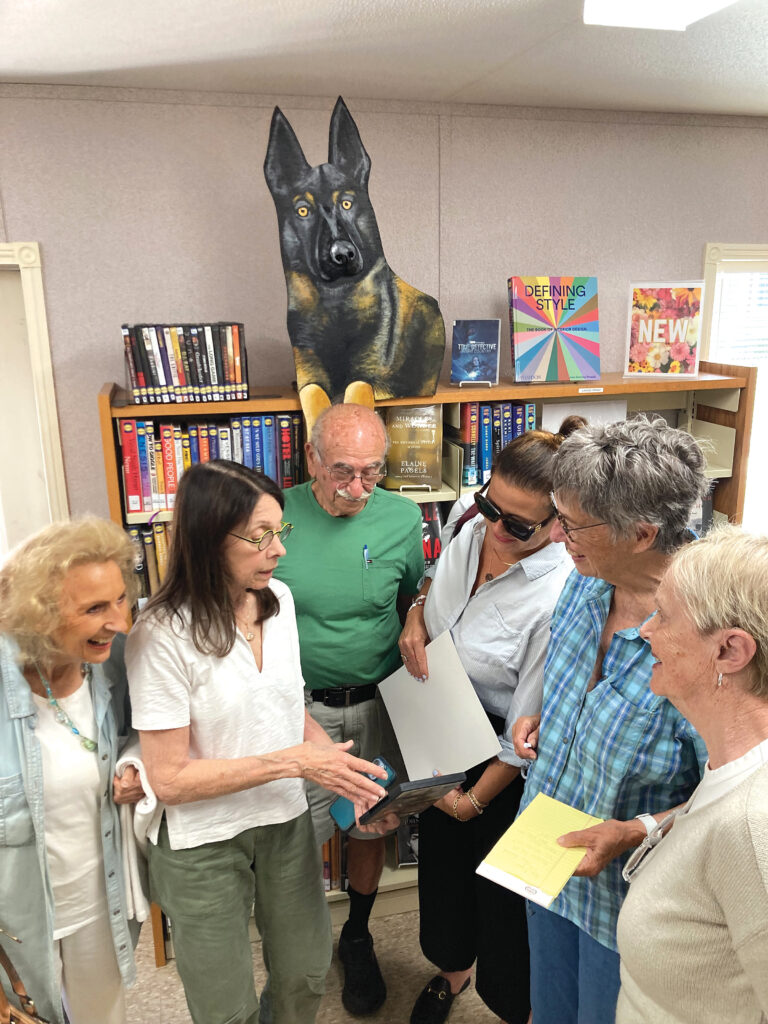Administration slashes federal aid to libraries: Shelter Island, other libraries concerned about community services

The funding stream that supplies federal funding to local library systems — providing money for capital improvements, cultural preservation, internet access and other initiatives — has been slowed to a trickle under a recent executive order by President Donald Trump (R).
The executive order signed March 14 by the president called for the reduction of the Institute of Museum and Library Services (IMLS), an independent government agency, created in 1996, which is the primary source of support for the nation’s museums and libraries. The president’s order deemed the institute an “unnecessary” element of the federal government.
Area library directors are growing alarmed about the federal government slashing aid to local libraries.
The IMLS’s 2024 fiscal year budget was nearly $295 million, with roughly $211 million accounting for the Office of Library Services. Approximately $8.1 million of that funding is funneled through the New York State Library in Albany by the institute’s Grants to States Program, a $180 million budget line in 2024.
“I was disturbed to hear of the dismantling of the IMLS and even more concerned when I heard on April 2nd that the IMLS Grants to States funding program was canceled,” said Shelter Island Library Director Terry Lucas. “This means that 85% of federally appropriated aid to the New York State Library was withdrawn. The New York State Library relies on that $8.1 million funding to support the 7,000 libraries, 72 library systems and itself.”
Ms. Lucas noted that although many Islanders may think that the New York State Library in Albany is a distant entity, the Shelter Island Library depends on the services it provides, including managing and distributing library construction grants. The Island’s library has received in the past, and hopes to benefit in the future, from support for continued construction and upgrades to the facility, Ms. Lucas said.
The New York State Library also “lead programs supporting early literacy, veterans’ services, summer reading programs and more,” Ms. Lucas added. Databases which support research and learning are provided by the State Library. Our State’s long history is also in the hands of the staff of the State Library.”
EAST END REACTION TO THE CUTS
On April 3, the nonprofit organization known as the American Library Association reported that “several states received written notification from IMLS Acting Director Keith Sonderling that their grants were canceled.” As of 7 p.m. April 3, California, Connecticut and Washington were the only states that received definitive notice of grant cancellation.
“Libraries are constantly doing more with less,” Mattituck-Laurel Library director Shauna Scholl said recently. “But there will come a point when we simply won’t be able to continue doing so, especially if the state and federal programs that support us locally are eroded.”
Ms. Scholl said while the library is funded primarily through local taxes, the support and services it receives through the federally-funded state library “are now at immediate risk.”
Floyd Memorial Library Director Ellen Nasto, Southold Free Library Caroline MacArthur, North Shore Public Library Director Laura Hawrey and Riverhead Free Library Director Kerrie McMullen-Smith echoed these concerns. Ms. Hawrey described the uncertainty of federal funding as a “gnawing concern” for local libraries.
The executive order called for the elimination of the institute’s “non-statutory components and functions” as well as reduction of “the performance of their statutory functions and associated personnel to the minimum presence and function required by law.”
Heads of each of the agencies impacted by the order were required to submit a report to Director of the Office of Management and Budget Russel Vought confirming compliance with the order and explaining which functions of their entity are “statutorily required and to what extent.”
The IMLS media contact did not respond to requests for comment about what plans the agency has to conform with the executive order.
SUFFOLK COOPERATIVE LIBRARY SYSTEMS
More than $5 million of federal funding from the IMLS trickles down to local libraries in Suffolk County through the Suffolk Cooperative Library System, which offers a variety of support services to its member libraries throughout the county with an annual budget of $20 million.
SCLS helps support the county’s local libraries by coordinating distribution of shared services like “Libby” — a mobile app that gives library patrons access to millions of ebooks and audiobooks, which draws from a $7 million budget line. SCLS Director Kevin Verbesey said 3.6 million items were borrowed from Libby across Suffolk County in 2024.
The library system also coordinates internet bandwidth services for local libraries and a countywide “lending library” service for books and events.
“There’s a wealth of different things that we work at the cooperative level,” Mr. Verbesey said in an interview late last month. “All of which are at some level of risk with the loss of state support and federal support.”
FEDERAL E-RATE PROGRAM
The executive order affecting the IMLS is one of several things Mr. Verbesey is concerned will have a “deep and troubling impact on libraries and, quite frankly, on all public services.” A bigger issue, he believes, are efforts to upend the $4 billion federal E-rate program that helps schools and libraries offset the costs of internet bandwidth.
The program “was authorized by Congress as part of the Telecommunications Act of 1996 and created by the Federal Communications Commission in 1997,” according to the System for Award Management website.
The effort to undercut the E-rate program is being spearheaded by the Washington-based conservative advocacy group Consumers’ Research in U.S. Supreme Court. Its concern is that, “The Universal Services Administration Company makes quarterly recommendations to the FCC for how much telecommunications companies must contribute to the fund,” and that the FCC effectively “rubberstamps the recommendations,” according to a March 26 Education Week report.
The U.S. Supreme Court “signaled that it is unlikely to upend” the program, the report noted, with Justice Samuel Alito Jr. questioning “the broader impact of a sweeping decision [to undo] the program.”
Across Long Island, roughly $30 million helps ensure access to stable, high-speed internet.
“The E-rate program obviously makes sense from an education, economic development and personal enrichment perspective,” Mr. Verbesey said. “But it’s also critical to public safety. Schools and libraries are made of cement and steel … where cellular service doesn’t work as well. So without these internet connections, it’s hard to contact the outside world.”
Every year the Shelter Island Library has about 20,000 connections made to the internet on computers and through WiFi connections,
When libraries aren’t able to provide free access to information, Mr. Verbesey added, they will have to turn to private sources “which will put a strain on local library budgets.”
“In general, government thrives on stability,” Mr. Verbesey said. “And when somebody commits to giving you funding and you put it into your budget for the next year — the expectation is it will come to you so you can undertake your plans. When all of a sudden somebody changes their decisions on things that have already been set in stone — or at least set in the law — it just makes it very difficult to function.”
Ms. Lucas called for increased advocacy for the Shelter Island Library. “While we’re in temporary quarters, we rely on our neighboring libraries to provide materials to our patrons, the distribution of which is managed by the Suffolk Cooperative Library System (SCLS). They provide technical help, electronic resources, professional education and manage Libby, the very popular digital book service. If SCLS has to cut services due to this action, it will necessarily impact what we can offer our patrons.”
Along with other area library directors, Ms. Lucas urged Islanders to contact their State and Federal representatives. “Let them know that the library is an essential and important part of this community,” she said. “If you’re interested in becoming a library advocate, please go to our website — silibrary.org — and click on the link.”









